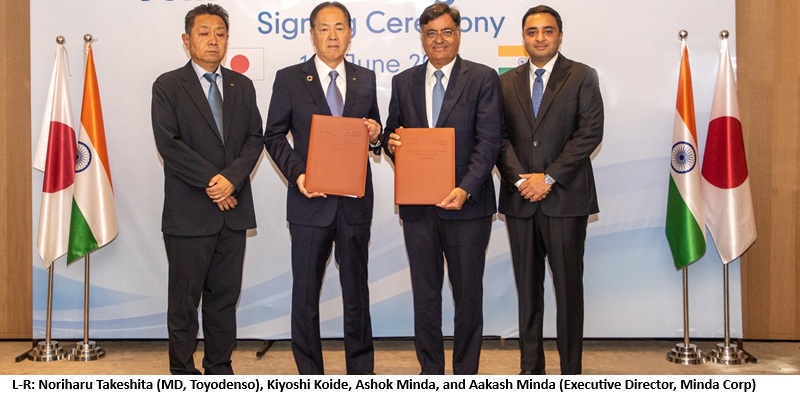Schedule a Call Back
An Overview of MSMEs in India
 Technical Articles
Technical Articles- Jun 02,11
Micro, Small and Medium Enterprises (MSMEs) the world over are accepted as engines of economic growth and providers of employment. MSMEs constitute a major chunk of the total enterprises in many countries and account for a major share of industrial production and exports, not to mention the role they play in employment generation.
 In India, MSMEs play a pivotal role in the overall industrial economy of the country. According to official figures, MSMEs account for more than 80 per cent of the total number of industrial units and produce over 8000 value-added products. In terms of value, the sector is estimated to account for 45 per cent of the manufacturing output and 40 per cent of the total export of the country and employs over 6 crore people.
In India, MSMEs play a pivotal role in the overall industrial economy of the country. According to official figures, MSMEs account for more than 80 per cent of the total number of industrial units and produce over 8000 value-added products. In terms of value, the sector is estimated to account for 45 per cent of the manufacturing output and 40 per cent of the total export of the country and employs over 6 crore people.
In India, the enterprises have been classified broadly into two categories:
(i) Manufacturing; and
(ii) Those engaged in providing/rendering of services.
Both categories have been further classified into micro, small and medium enterprises based on their investment in plant and machinery (for manufacturing enterprises) or on equipment (in case of enterprises providing or rendering services).
MSMEs in Manufacturing Sector
Manufacturing Sector refers to enterprises engaged in manufacture or production, processing or preservation of goods. Please refer First Schedule to the Industries (Development and Regulation) Act, 1951 for the list of eligible industries engaged in the manufacturing sector.

The definition of Micro, Small and Medium Enterprises under the manufacturing sector is as below:
i. A micro enterprise is an enterprise where investment in plant and machinery [original cost excluding land and building and the items specified by the Ministry of Small Scale Industries vide its notification No. S.O. 1722(E) dated October 5, 2006 does not exceed Rs. 25 lakh;
ii. A small enterprise is an enterprise where the investment in plant and machinery [original cost excluding land and building and the items specified by the Ministry of Small Scale Industries vide its notification No. S.O. 1722(E) dated October 5, 2006] is more than Rs.25 lakh but does not exceed Rs.5 crore; and
iii. A medium enterprise is an enterprise where the investment in plant and machinery (original cost excluding land and building and the items specified by the Ministry of Small Scale Industries vide its notification No. S.O. 1722(E) dated October 5, 2006) is more than Rs.5 crore but does not exceed Rs.10 crore.
MSMEs in Services Sector
Services sector refers to enterprises engaged in providing or rendering of services. These will include small road & water transport operators (owning a fleet of vehicles not exceeding ten vehicles), small business (whose original cost price of the equipment used for the purpose of business does not exceed Rs.20 lakh) and professional & self employed persons (whose borrowing limits do not exceed Rs.10 lakh of which not more than Rs.2 lakh should be for working capital requirements except in case of professionally qualified medical practitioners setting up of practice in semi-urban and rural areas, the borrowing limits should not exceed Rs.15 lakh with a sub-ceiling of Rs.3 lakh for working capital requirements).
The definition of Micro, Small and Medium Enterprises under the services sector is as below:
i. A micro enterprise is an enterprise where the investment in equipment does not exceed Rs.10 lakh;
ii. A small enterprise is an enterprise where the investment in equipment is more than Rs.10 lakh but does not exceed Rs.2 crore; and
iii. A medium enterprise is an enterprise where the investment in equipment is more than Rs.2 crore but does not exceed Rs.5 crore.
Problems Faced by MSMEs
Speaking at the inaugural ceremony of IPF's Engeetech held in Chennai in February this year, the Director of the MSME Development Institute, Chennai, Mr S Sivagnanam, pointed out that MSMEs in the country suffered from a lack of awareness about the various financial assistance schemes available to them through the State and Central governments. What follows is an attempt to highlight some of the Schemes available to MSMEs through various agencies of the Ministry of Micro, Small & Medium Enterprises, Government of India. Detailed information can be obtained from the Offices of the Development Commissioners based in the respective regions, or from the website http://www.dcmsme.gov.in/schemes/sidoscheme.htm
1. National Manufacturing Competitiveness Programme (NMCP) Schemes: Objective to support the Small and Medium Enterprises (SMEs) in their endeavor to become competitive and adjust the competitive pressure caused by liberalisation and moderation of tariff rates.
2. Micro & Small Enterprises Cluster Development Programme (MSE-CDP) : For holistic development of selected MSE clusters through value chain and supply chain management on co-operative basis.
3. Credit Linked Capital Subsidy Scheme for Technology Upgradation: Aims at facilitating Technology Upgradation of Micro and Small Enterprises by providing 15% capital subsidy (12% prior to 2005) on institutional finance availed by them for induction of well established and improved technology in approved sub-sectors/products. The admissible capital subsidy under the revised scheme is calculated with reference to purchase price of Plant and Machinery. Maximum limit of eligible loan for calculation of subsidy under the revised scheme is also been raised Rs 40 lakh to Rs 100 lakh w.e.f. 29-09.2005.
4. ISO 9000/ISO 14001 Certification Reimbursement Scheme: Incentive Scheme of Reimbursement of expenses for acquiring Quality Management System (QMS) ISO 9000 certification/environment management (EMS) ISO 14001 certification to the extent of 75% or Rs.75,000/- whichever is lower.
5. MSME MDA: The scheme offers funding up to 75% in respect of to and fro air fare for participation by MSME Entrepreneurs in overseas fairs/trade delegations. The scheme also provides for funding for producing publicity material (up to 25% of costs); Sector specific studies (up to Rs. 2 lakhs) and for contesting anti-dumping cases (50% upto Rs. 1 lakh) - for individual MSMEs & Associations. Participation in the International Exhibitions/ Fairs - For registered Small & Micro manufacturing enterprises with DI/DIC.
6. Financial Assistance for using Global Standards (GS1) in Barcoding: Recognised the importance of bar coding and avail financial assistance through Office of DC(MSME).
7. Mini Tool Rooms: Assistance upto 90% or Rs.9.00 crore, whichever is less, for setting up new Mini Tool Rooms. For upgradation of existing Tool Rooms, assistance is 75% or Rs.7.5 crores - for State Governments.
8. Assistance to Entrepreneurship Development Institutes: For strengthening training infrastructure in EDIs, assistance upto 50% or Rs. 50 lakh whichever is less - for State Governments.
9. Scheme of National Award: The Micro, Small &Medium Enterprises (MSMEs) in India have seen a vast development in the last five decades. The MSMEs have registered tremendous growth as also progress in terms of quality production, exports, innovation, product development and import substitution, very much beyond the expected objectives of setting up MSMEs by the planners of industrial production base in the country.
Empowering SMEs
Availability of "timely" and "adequate" credit is a critical component for competitiveness of firms, be it for enhancing efficiency by technology upgradation, investing in innovation efforts or for expansion of capacity to reap economies of scale. The SME Rating Agency of India Ltd (SMERA) was set up to ameliorate the information asymmetry and create a suitable environment for increasing the flow of credit to the SME sector. SIDBI, Dun & Bradstreet, Credit Information Bureau (India) Limited (CIBIL), and leading banks of India in both public and private sector as well as certain foreign banks joined hands to set up SMERA. As the only rating agency exclusively for the SME sector in India, SMERA started operations in September 2005. The ratings provided by SMERA are in the form of comprehensive assessment of the overall condition of the SMEs.
The rating conducted by SMERA takes into account the financial condition and several qualitative factors that have bearing on credit worthiness of the SMEs like conduct of the account, relationship with suppliers and customers, local intelligence, management's initiative and vision, quality processes, etc. Often many of these strengths are not reflected in the financial statements of SMEs in the absence of uniform disclosure requirements and discipline.
Benefits of SMERA Ratings
SMERA looks at an SME independently and objectively. Rating by SMERA acts as a decision support system and aids the bank in holistic assessment of a unit at enterprise level. A better rating from SMERA leads to more favourable credit terms for the SME. These include lower collateral requirements, lower interest rates and simplified lending norms. SMERA rating facilitates banks/lending institutions in reducing the turnaround time in processing credit applications, thereby providing SMEs access to timely and adequate credit.
(For further details please contact Development Commissioner (MSME) Government of India Ministry Of Micro, Small & Medium Enterprises, Nirman Bhavan, New Delhi-110 108 www.dcmsme.gov.in
SME Rating Agency of India Limited, Seagull House, 1st Floor, Plot No. 6, Shivaji Colony, Andheri - Kurla Road, Chakala, Andheri (East), Mumbai 400 099 Tel: 022 6714 1177 / 2518 8108 Fax: 022 6714 1142 Email: info@smera.in)
Related Products

Heat Exchanger Scale Removal Compound -hesr-300


Universal Tapping Machine -model Tr-10/15
Tapping
Machine Tools offers universal tapping machine -model TR-10/15.
Hi There!
Now get regular updates from IPF Magazine on WhatsApp!
Click on link below, message us with a simple hi, and SAVE our number
You will have subscribed to our Industrial News on Whatsapp! Enjoy














